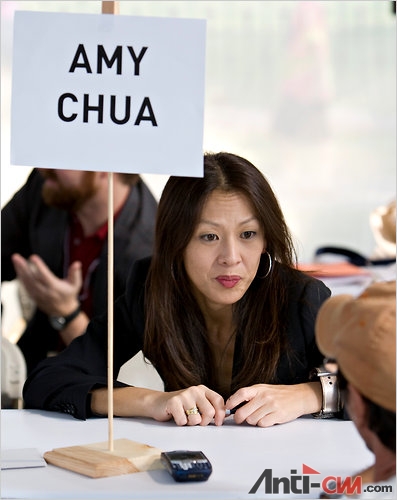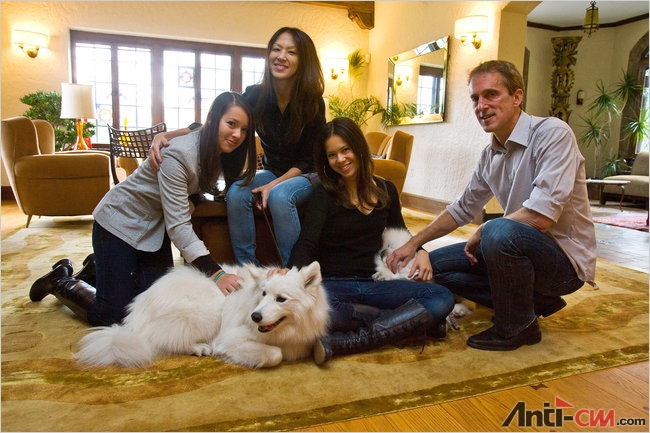【中文标题】虎妈撤退(中西方教育理念比对系列文章之五)
【原文标题】Retreat of the ‘Tiger Mother’
【登载媒体】纽约时报
【原文作者】KATE ZERNIKE
【原文链接】http://www.nytimes.com/2011/01/16/fashion/16Cultural.html?_r=1

作者在2007年签售会上。
你敢不敢在剑桥、斯卡斯代尔、埃文斯顿、马林郡这几个常春藤高校发源地做以下事情?
宣称:亚裔美国人培养成功孩子的方法是,不让他们参加聚会、不许在外过夜、在学校中所有科目的分数都必须是A。
记得还要说,你曾经管自己超级成功的亚裔美国女儿叫“废物”。你曾经威胁把自己女儿的玩具扔掉,整个一晚上不让她去卫生间,直到她可以顺利地演奏一首复杂的钢琴曲。你当着她们的面把她们在4岁和7岁时自己做的生日卡片撕碎,说你要看到她们更好的表现。
而且,你最好再写一本书描述这些行为。
你会得到什么反应?
自从《华尔街日报》以“为什么中国母亲是优秀的”为题发表了Amy Chua一本新书的节选文章之后,这位耶鲁法学院的教授说,她收到了“成百上千”的电子邮件和死亡威胁。文章引发了网站上5000多条评论和数不清的博客文章,大家都在谈论这位“虎妈”。有些人认为,那些为数不多被哈佛看中的亚洲学生的父母,肯定是做对了一些事情。还有很多人管Chua女士叫“魔鬼”、“疯子”或狡猾的奸细。
一个法律博客中的文章认为她的故事中包含一些《亲爱的妈咪》元素(不!永远不要用铁丝衣架!)。(译者注:根据女明星琼克劳馥的女儿克莉丝汀娜克劳馥的原著改编而成,描述这位四、五十年代的大明星,在私生活中用各种惨无人道的方式来虐待她的儿女,令崇拜明星妈妈的四个养子养女感到爱恨交加。琼克劳馥发现养女没有依照嘱咐,用上好绸缎包裹的衣架来挂衣服,却用铁丝衣架时。不禁勃然大怒,随手抄起衣架,没头没脑地将养女毒打一顿边打边骂:“不!永远不要用铁丝衣架!”)另一篇帖子题目是“Amy Chua这样的父母就是像我一样的亚裔美国人为什么在接受治疗的原因”。YouTube上的一个台湾视频(英文字幕)认为,Chua女士根本不在乎她的孩子长大后精神不正常或者叛逆,只要书卖得好就行。
Chua女士在星期四接受电话采访时说:“这有点让我吃惊,而且有些过分了”,她“从早到晚”不停地“澄清一些误会”。她说,自己的文章本意是讽刺和自嘲——“我自己认为这些事很有趣,甚至有些愚蠢。”

Amy Chua,《虎妈战歌》的作者,与他的丈夫Jed Rubenfeld和两个女儿,Lulu(左)、Sophia。
但是如果翻开她的书《虎妈战歌》,我们很难理解她是不是在开玩笑。
在书中,她描述道曾经有一次,她威胁如果女儿不能完美地弹奏一首钢琴曲,她就要烧掉女儿的毛绒玩具。她在后边写道:“回想起来,这种教育方式似乎有些极端。但从另一方面来看,这的确有很好的效果。”
在接受采访时,她表现得既含糊又矛盾。她说:“我认为我在恰当的时候会停止一些行为,我不认为我的家里有任何虐待的现象。”然而她又说:“我赞同很多西方教育人士对我的批评,我认为在如何获得真正的自信这个问题上,有很多值得探讨的内容。”
她说,她自己唯一做错的事情就是讲出了实话。“我感觉人们似乎不愿意披露自己真实的教育方式。随便找一个十来岁孩子的家庭,有哪个没有叫喊和冲突?”
就像她自己所说,Chua女士是属于那种热衷于亚洲/犹太学术权威并居住在大学城里的人。她的丈夫Jed Rubenfeld也是一名耶鲁法律教授,并出版过两本畅销的科幻小说。Chua女士自己也出版过两本书,据说她的新作《虎妈》已经预先得到了6位数的稿酬。
她说,如果还有一个遗憾,就应该是《华尔街日报》上的摘录,尤其是文章标题,并未反映出书中的全部内容。
她的新书是一部回忆录,结尾讲述的是她的小女儿拒绝忍受这种“极端的教育方式”。Chua女士曾经试图阻止第三代亚裔美国人的退化,不要出现郊区足球队的孩子个个都是最佳球员的现象。
她说:“我被迫回答一些书中根本没有提到的问题,我并不是说人们应该怎么做,而是说‘我是怎么做的,我如何因此得到了教训’。”书中有三段副标题,其中明确说明“我是如何被一个13岁的孩子羞辱的”。
48岁的Chua女士出生于菲律宾的一个中国家庭,在麻省理工学院读书,后来毕业于哈佛法学院,在那里担任《法律评论》的高级编辑。她在书中承认自己“不大会享受生活”,也不像其它法律专业学生那样擅于提问和怀疑。“我就是把教授讲的话原原本本纪录下来然后记住。”
她决心按照父母教育自己和三个妹妹的方式来教育自己的孩子——也就是,让她们崇拜自己的父母。根据她的叙述,大女儿Sophia很顺从,也很优秀,曾经在卡耐基音乐厅演奏钢琴。但是小女儿Lulu有些叛逆。作为回忆录中情节的一个转折点,13岁的Lulu在莫斯科一家餐厅中把杯子摔碎,冲她妈妈大喊:“我讨厌我的生活,我讨厌你。”
Chua女士的丈夫在《虎妈》中没有被过多地提及。只有一次,他担心她把女儿压迫得太过分,家里“没有呼吸的空间”。她给予了抨击。
“你就知道写你的书,考虑你自己的未来。你认为Sophia和Lulu应当实现什么梦想?你有想过吗?你认为Coco应当实现什么梦想?”他忍不住笑出来——Coco是他们的狗。
她继续说:“我不明白这有什么好笑的,不过我很高兴我们的争吵结束了。”
Chua女士说,一开始的时候,她花费很多篇幅描述她和丈夫之间有关教育孩子的冲突。但是这些内容都要经过他的批准,他总是在说很多都是杜撰的,所以她干脆就放弃了这些内容。
她说:“这主要是我自己的故事。在家里,我属于那种具有过于自信的移民思想、完全了解如何教育孩子的人。我丈夫的思维方式比较大众化,他的想法很多,但是不知道哪种最好。我是愿意投入时间的人。”
她还说,孩子们的薄饼和水上乐园之旅都来自他们的父亲,他的家庭比较倾向于鼓励自我探索的行为。
这本书引起了一些痛苦的回忆,尤其是在极端亚洲化的家庭中成长起来的人群中。Betty Ming Liu是来自越南的中国移民(译者注:原文如此),她对这本书的博客评论很受欢迎。她说:“让我感到恐怖的是拥护这种方式的人竟然出生在美国,而我们亚洲人都在尽量避免这种教育方式。”一名加利福尼亚女士回忆她的姐姐是如何变得像Chua女士所意图塑造的哪种“完美”,但没料到结果竟然会自杀,因为她害怕告诉别人无法忍受情绪低落的痛苦。
Ann Hulbert是《美国崛起》一书的作者,该书介绍了长达一个世纪的有关教育理念争论的历史。她正在写一本有关天才儿童的书,她认为很容易再次爆发“妈咪战争”。
在谈到Chua女士时,她说:“她的书中有一种大道既存的思想,这种绝对的自信与美国教育精英现行的理念是如此的格格不入,以至于它立即引发出与其完全对立的一套自信理念,其实这种理念原本是不存在的。”
朋友们眼中的Chua女士是个谦虚的人,有点冷幽默;孩子总是高高兴兴的;家里经常传出音乐声和各种活动的声音,当然,充满了爱。
Alexis Contant自称自己是Chua女士20多年的老朋友,他说:“她并不是没有主意的人,她写的是一个回忆录,不是育儿指南。她或许会说在外过夜不好,但我从未听她说‘我简直不敢相信某某人竟然让孩子在外过夜’。”
Chua女士说她的女儿其实很愿意站出来支持书中的内容,她只不过不愿意让她们暴露在公众面前。她说,其实她们还是参加了一些聚会,虽然没有9到13岁年龄段的其它孩子们参加的那么多,因为她们要练习演奏乐器。现年18岁的Sophia有一个男朋友,她说:“别人孩子有的东西我的孩子都有,iPod什么的,她们还有iTunes的账户。”
Chua女士的书中大部分内容都是在8个星期里写作完成的,但是结尾颇耗费了一些时间,因为东西方教育方式的矛盾让她无所适从。她说:“结尾花的时间比较长。心情不好的时候,我自己都认为这种教育方式糟透了。但是心情好的时候,比如Lulu说:‘真感谢你让我修改了一遍我的作文,老师在课堂上当众朗读了。’我觉得还是应该高举我的大棒。”
本周,她的新书签售会让她有机会去到争论最为激烈的地区,比如海湾地区、剑桥和华盛顿西北部。
但更重要的是,家庭计划为Lulu庆祝15岁生日。她们打算带着孩子和8个孩子的朋友去纽约,在外过夜。
原文:
The author at a 2007 book signing.
TRY this at a dinner party in one of the hothouses of Ivy League aspiration — Cambridge, Scarsdale, Evanston, Marin County:
Declare that the way Asian-American parents succeed in raising such successful children is by denying them play dates and sleepovers, and demanding that they bring home straight A’s.
Note that you once told your own hyper-successful Asian-American daughter that she was “garbage.” That you threatened to throw out your other daughter’s dollhouse and refused to let her go to the bathroom one evening until she mastered a difficult piano composition. That you threw the homemade birthday cards they gave you as 7- and 4-year-olds back in their faces, saying you expected more effort.
Better yet, write a book about it.
What kind of reaction might you get?
In the week since The Wall Street Journal published an excerpt of the new book by Amy Chua, a Yale law professor, under the headline “Why Chinese Mothers Are Superior,” Ms. Chua has received death threats, she says, and “hundreds, hundreds” of e-mails. The excerpt generated more than 5,000 comments on the newspaper’s Web site, and countless blog entries referring in shorthand to “that Tiger Mother.” Some argued that the parents of all those Asians among Harvard’s chosen few must be doing something right; many called Ms. Chua a “monster” or “nuts” — and a very savvy provocateur.
A law blog suggested a “Mommie Dearest” element to her tale (“No. Wire. Hangers! Ever!!”). Another post was titled “Parents like Amy Chua are the reason Asian-Americans like me are in therapy.” A Taiwanese video circulating on YouTube (subtitled in English) concluded that Ms. Chua would not mind if her children grew up disturbed and rebellious, as long as she sold more books.
“It’s been a little surprising, and a little bit intense, definitely,” Ms. Chua said in a phone interview on Thursday, between what she called a “24/7” effort to “clarify some misunderstandings.” Her narration, she said, was meant to be ironic and self-mocking — “I find it very funny, almost obtuse.”
Amy Chua, author of "Battle Hymn of the Tiger Mother," with her husband, Jed Rubenfeld, and daughters Lulu, left, and Sophia.
But reading the book, “Battle Hymn of the Tiger Mother,” it can be hard to tell when she is kidding.
“In retrospect, these coaching suggestions seem a bit extreme,” she writes in the book after describing how she once threatened to burn her daughter’s stuffed animals if she did not play a piano composition perfectly. “On the other hand, they were highly effective.”
In interviews, she comes off as unresolved. “I think I pulled back at the right time,” she said. “I do not think there was anything abusive in my house.” Yet, she added, “I stand by a lot of my critiques of Western parenting. I think there’s a lot of questions about how you instill true self-esteem.”
Her real crime, she said, may have been telling the truth. “I sort of feel like people are not that honest about their own parenting,” she said. “Take any teenage household, tell me there is not yelling and conflict.”
Ms. Chua is one half of the kind of Asian-Jewish academic power couple that, as she notes, populates many university towns. Her husband is Jed Rubenfeld, also a Yale law professor, and the author of two successful mystery novels. Ms. Chua, herself the author of two previous books, was reported to have received an advance in the high six figures for “Tiger Mother.”
If she has one regret, she said, it is that the Journal excerpt, and particularly the headline, did not reflect the full arc of her story.
Her book is a memoir that ends with her relenting (sort of) when the younger of her two teenage daughters refuses to go along with the “extreme parenting” Ms. Chua uses to prevent the kind of decline that she thinks makes some third-generation Asian-Americans as soft and entitled as their teammates on suburban soccer teams where every child is declared Most Valuable Player.
“I’ve been forced to answer questions about a book I didn’t write,” she said. “It’s not saying what people should do, it’s saying, ‘Here’s what I did, and boy did I learn a lesson.’ ” All this is captured, she said, in the book’s three-paragraph subtitle, which concludes with the words, “and how I was humbled by a thirteen-year-old.”
Born to Chinese parents who were raised in the Philippines and attended the Massachusetts Institute of Technology, Ms. Chua, 48, graduated from Harvard and Harvard Law, where she was an executive editor of the Law Review. She confesses in her book that she is “not good at enjoying life,” and that she wasn’t naturally curious or skeptical like other law students. “I just wanted to write down everything the professor said and memorize it.”
She was determined to raise her daughters the way she and her three sisters had been raised — which, she said, left them adoring their parents. By her account, her elder daughter, Sophia, complied, excelled and played piano at Carnegie Hall. But the younger, Lulu, rebelled. At the turning point of the memoir, Lulu, then 13, begins smashing glasses in a Moscow restaurant and yelling at her mother, “I HATE my life, I HATE you.”
Ms. Chua’s husband appears only peripherally in “Tiger Mother” — though there is one battle in which she lashes out at him after he worries that she is pushing their daughters to the point that there is “no breathing room” in their home.
“All you do is think about writing your own books and your own future,” she says to him. “What dreams do you have for Sophia or for Lulu? Do you ever think about that? What dreams do you have for Coco?” He bursts out laughing — Coco is their dog.
She concludes, “I didn’t understand what was so funny, but I was glad our fight was over.”
Initially, Ms. Chua said, she wrote large chunks about her husband and their conflicts over child rearing. But she gave him approval on every page, and when he kept insisting she was putting words in his mouth, it became easier to leave him out.
“It’s more my story,” she said. “I was the one that in a very overconfident immigrant way thought I knew exactly how to raise my kids. My husband was much more typical. He had a lot of anxiety, he didn’t think he knew all the right choices.” And, she said, “I was the one willing to put in the hours.”
Still, she said, her children got pancakes and trips to water parks because of their father, the son of parents more inclined to encourage self-discovery.
The reaction to the book was particularly anguished among those who are products of extreme Asian parents. “I’m horrified that she’s American-born and hanging on to this, when most of us are trying to escape it,” said Betty Ming Liu, the daughter of Chinese immigrants from Vietnam and author of one of the many blog posts about the book. A California woman recalled how her sister became the perfect Asian daughter Ms. Chua aspires to produce, only to kill herself because she was afraid to tell anyone she suffered from depression.
Ann Hulbert, the author of “Raising America,” a history of a century’s worth of conflicting child-rearing advice, who is writing a book about child prodigies, notes that it is not hard to reignite the Mommy Wars.
“There is a kind of utter certainty in her writing,” she said of Ms. Chua, “and that confidence goes so against the underlying grain of American parenting and child-rearing expertise that it immediately elicits a response that then suggests a kind of certainty on the other side that isn’t there, either.”
Friends describe Ms. Chua as self-deprecating and a dry wit, her children as happy, and their home as humming with music and activity and, yes, love.
“Not that she’s without opinion, but she’s writing a memoir, not a parenting guide,” said Alexis Contant, who describes Ms. Chua as her closest friend for 20 years. “She will say sleepovers are overrated, but I have never heard her say, ‘I can’t believe so-and-so let their kid do it.’ ”
Ms. Chua said that her daughters have been eager to speak out in favor of the book; she is shielding them from the publicity. She said, however, that they did ultimately have play dates — though not many between the ages of 9 and 13, due to music practice. Sophia, now 18, has a boyfriend, she told me. “My kids have whatever those things are called — iPods,” she said. “They have iTunes accounts.”
Ms. Chua wrote most of the book in eight weeks, yet struggled with the end, she said, reflecting the East-West tug on her parenting. “It’s a work in progress,” she said. “On bad days I would say this method is terrible. I just need to give them freedom and choice. On good days, when Lulu would say: ‘I’m so glad you made me write that second draft of my essay. My teacher read it out loud,’ I think, I’ve got to stick to my guns.”
This week, her book tour will take her to the places where she has surely sparked the most debate: the Bay Area, Cambridge and the northwest quadrant of Washington.
But first, the family was planning to celebrate Lulu’s 15th birthday. They were taking her and eight of her friends to New York City. For a sleepover. |